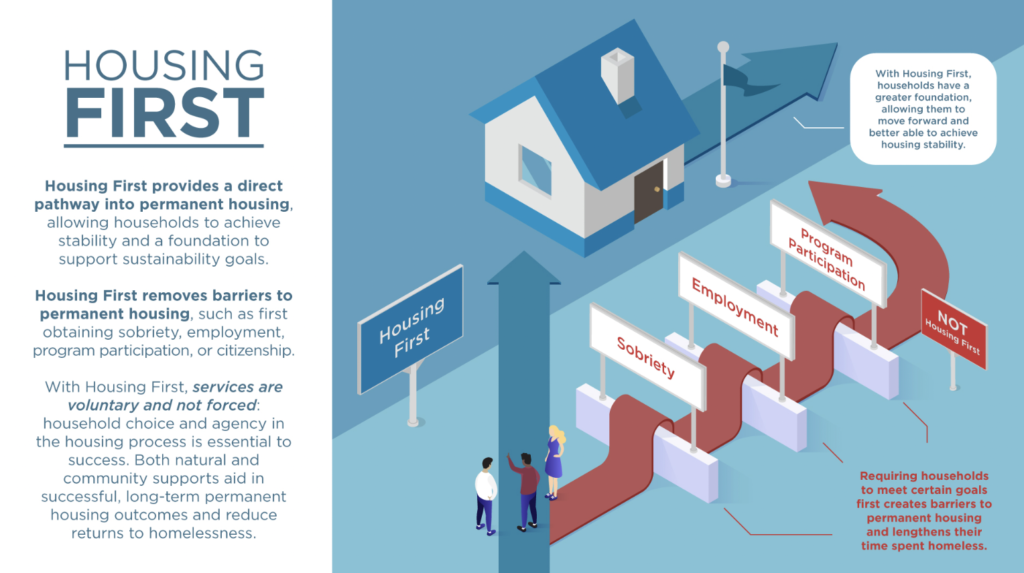Housing First

We believe that:
- Housing is a basic human right.
- Homelessness is a solvable problem.
- Our community is equipped with resources to impact positive change.
We put these principles into action by educating, encouraging, and helping to implement Housing First practices in Memphis and Shelby County, supporting and providing resources to agencies that follow this model. Housing First practices have existed in Memphis for over a decade, and there are currently over 1,000 beds in our community in both Permanent Supportive Housing and Rapid Rehousing programs dedicated to ending homelessness for individuals and families using the Housing First model.
If you or someone you know is currently homeless, view our Resources Guide to get connected with one of our partner agencies and assessed to find out if you may qualify for a Housing First program.
Criminalization worsens homelessness.
The criminalization of homelessness refers to policies, laws, and local ordinances that make it illegal, difficult, or impossible for unsheltered people to engage in life-sustaining activities such as sleeping, eating, asking for donations, or simply existing in public spaces. Over the past 25 years, cities across the country have enacted policies that make it effectively illegal to be unsheltered despite a critical shortage of homeless shelter beds and housing supports.
Click here to understand what the criminalization of homelessness looks like in Memphis and Shelby County. Learn how you can help us advocate for better practices and be a part of the solution.
Housing is a basic human right.
Housing First ensures that anyone—even those with the highest barriers—can receive housing. While traditional approaches may require individuals to meet preconditions like following service participation requirements, maintaining sobriety, or gaining income before placing someone into housing, the Housing First approach prioritizes placement in permanent housing as the first step.
However, Housing First does not mean housing only; Housing First ensures that individuals and families have access to the supportive services they want and need to remain in housing. These services are flexible and client-driven; Housing First recognizes that people have the agency and autonomy to choose the services that they need, and they are more likely to successfully utilize these services and remain in housing if given the choice.
“A Housing First system orientation recognizes that people experiencing homelessness—like all people—need the safety and stability of a home in order to best address challenges and pursue opportunities.“
– U.S. Interagency Council on Homelessness
The goal of our community’s Coordinated Entry System is to ensure that those who are the most vulnerable receive the housing and supportive services that are the best fit for them. While some individuals and families may need only short- or medium-term assistance and successfully regain housing in a Rapid Rehousing (RRH) program, others may need long-term assistance in a Permanent Supportive Housing (PSH) program.
Homelessness is a solvable problem.
Housing First practices are evidence-based; this model has proven to be an extremely effective intervention for ending homelessness in Memphis and Shelby County, as well as across the United States. In our community, overall homelessness, including chronic homelessness, has declined since implementing Housing First practices.
“This is what we mean by Housing First: that homelessness is a problem with a solution, and that the solution is housing. For everyone. Whether you follow the rules or not. Whether you are ‘compliant’ with treatment or not. Whether you have a criminal record or not. Whether you have been on the streets for one day or ten years. Permanent housing is what ends homelessness. It is the platform from which people can continue to grow and thrive in their communities.”
– National Alliance to End Homelessness
Individuals and families who enter Housing First programs are extremely likely to remain in permanent housing long-term, and they are very unlikely to return to homelessness in the future. In our community, over 94% of individuals and families served in Housing First programs remain permanently housed for over one year.
Our community is equipped with resources to impact positive change.
Housing First practices are a cost-effective solution to homelessness. Dozens of studies have reached the same conclusion—it is significantly less expensive to provide supportive housing than it is to manage homelessness in other ways. When individuals and families enter Housing First programs, they are much less likely to frequently utilize expensive systems like shelters, emergency rooms, and jails. By shifting resources that already exist within our community to embrace Housing First practices, the community benefits in multiple ways.
